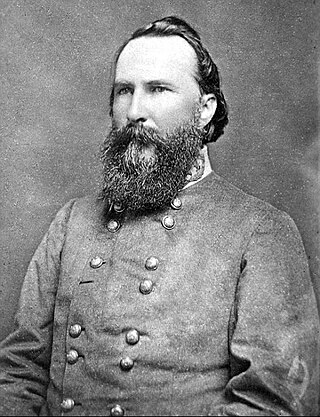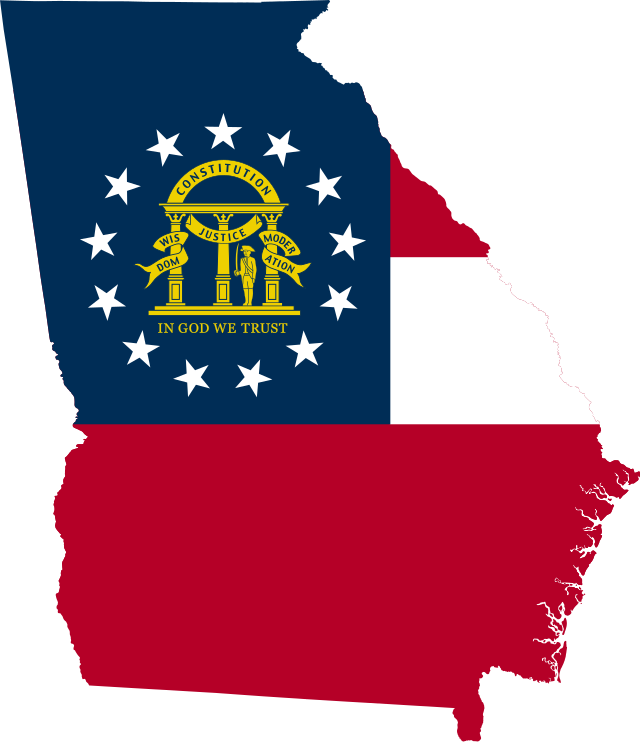Portal:Georgia_(U.S._State)
|
Georgia /ˈdʒɔːrdʒə/ ⓘ is a state located in the southeastern United States. It was established in 1732, the last of the original Thirteen Colonies. Named after King George II of Great Britain, Georgia was the fourth state to ratify the United States Constitution, on January 2, 1788. It declared its secession from the Union on January 21, 1861, and was one of the original seven Confederate states. It was the last state to be restored to the Union, on July 15, 1870. Georgia is the 24th most extensive and the 8th most populous of the 50 United States. From 2007 to 2008, 14 of Georgia's counties ranked among the nation's 100 fastest-growing, second only to Texas. Georgia is known as the Peach State and the Empire State of the South. Atlanta is the state's capital and its most populous city. Georgia is bordered on the south by Florida; on the east by the Atlantic Ocean and South Carolina; on the west by Alabama; and on the north by Tennessee and North Carolina. The northern part of the state is in the Blue Ridge Mountains, a mountain range in the vast Appalachian Mountains system. The central piedmont extends from the foothills to the fall line, where the rivers cascade down in elevation to the continental coastal plain of the southern part of the state. The highest point in Georgia is Brasstown Bald, 4,784 feet (1,458 m); the lowest point is the Atlantic Ocean. Georgia is the most extensive state east of the Mississippi River in terms of land area, although it is the fourth most extensive (after Michigan, Florida, and Wisconsin) in total area, a term which includes expanses of water which are part of state territory.
The Banks Lake National Wildlife Refuge is a 4,049 acre (16.4 km²) National Wildlife Refuge located in Lanier County, Georgia. Banks Lake is a natural pocosin or sink of ancient geologic origin. The refuge was established in 1985 for the protection and conservation of this unique environment as well as migratory and resident wildlife. An estimated 20,000 people visit the refuge each year. There is no dedicated budget or staff for the refuge; it is administered completely by the Okefenokee National Wildlife Refuge.  Credit: Ken Lund
The Georgia Dome was a domed stadium in the southeastern United States, currently under demolition. Located in Atlanta, Georgia, between downtown to the east and Vine City to the west, it was owned and operated by the State of Georgia as part of the Georgia World Congress Center Authority. Its successor, Mercedes-Benz Stadium, was built adjacent to the south and opened in August 2017.
State symbols:
James Longstreet (January 8, 1821 – January 2, 1904) was one of the foremost Confederate generals of the American Civil War and the principal subordinate to General Robert E. Lee, who called him his "Old War Horse." He served under Lee as a corps commander for many of the famous battles fought by the Army of Northern Virginia in the Eastern Theater, but also with Gen. Braxton Bragg in the Army of Tennessee in the Western Theater. Biographer and historian Jeffry D. Wert wrote that "Longstreet ... was the finest corps commander in the Army of Northern Virginia; in fact, he was arguably the best corps commander in the conflict on either side." Longstreet's talents as a general made significant contributions to the Confederate victories at Second Bull Run, Fredericksburg, and Chickamauga, in both offensive and defensive roles. He also performed strongly during the Seven Days Battles, the Battle of Antietam, and until he was seriously wounded, at the Battle of the Wilderness. His performance in semiautonomous command during the Knoxville Campaign resulted in a Confederate defeat. His most controversial service was at the Battle of Gettysburg, where he disagreed with General Lee on the tactics to be employed and reluctantly supervised the disastrous infantry assault known as Pickett's Charge. He enjoyed a successful post-war career working for the U.S. Government as a diplomat, civil servant, and administrator. However, his conversion to the Republican Party and his cooperation with his old friend, President Ulysses S. Grant, as well as critical comments he wrote in his memoirs about General Lee's wartime performance, made him anathema to many of his former Confederate colleagues. Authors of the Lost Cause movement focused on Longstreet's actions at Gettysburg as a primary reason for the Confederacy's loss of the war. His reputation in the South was damaged for over a century and has only recently begun a slow reassessment.
Select [►] to view subcategories
What are WikiProjects? Credit: Ebyabe
The Lapham-Patterson House is a historic site in Thomasville, Georgia. The house, built between 1884-85 as a winter cottage for businessman C.W. Lapham of Chicago, is a significant example of Victorian architecture. It has a number of architectural details, such as fishscale shingles, an intricately designed porch, long-leaf pine inlaid floors, and a double-flue chimney. Inside, the house was well-appointed with a gas lighting system, hot and cold running water, indoor plumbing, and modern closets. Its most significant feature is its completely intentional lack of symmetry. None of the windows, doors, or closets are square. The house is a Georgia Historic Site and is also a National Historic Landmark, which also puts it on the National Register of Historic Places.
edit · history · watch · purge The following Wikimedia Foundation sister projects provide more on this subject:
Discover Wikipedia using portals |





























